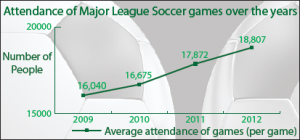Soccer finds new home in America

October 31, 2012
Soccer has been around for more than 150 years, but Americans are just now picking up the world’s game.
We have adapted to new technology, reconstructed legislature and foreign concepts pretty quickly throughout our brief history. What’s taken us so long with soccer?
Many Americans will tell you that no one here cares about the game. We have our football, baseball, basketball and hockey. There’s just no room for soccer in our world of sports.
Advertisement
I say otherwise.
But what’s most surprising about soccer’s expansion in the United States is where it’s coming from: Europe.
The Champions League, which is the championship tournament for Europe’s best club teams, brought Fox more than two million viewers during the final match between English club Chelsea and German club Bayern Munich in May 2012.
This figure is a 676 percent increase compared to when ESPN 2 hosted the Champions League final in 2002, according to Nielsen Media Research,.
NBC Universal signed a three-year deal with the Barclays English Premier League Tuesday that will allow NBC, its newly developed NBC Sports Network and two other NBC-owned channels to broadcast up to 380 games a year.
NBC Universal will spend an estimated $80 to $85 million a year for the deal, according to Richard Sandomir of the New York Times.
“The European soccer fan base is big in America because of all the stars,” said Bryan Musungu, a graduate student in planet and solar science from Fayetteville, N.C. “I feel like U.S. soccer (MLS) is starting to get bigger, but we’re not quite the best yet.”
Advertisement*
European soccer leagues such as the Premier League and Spain’s La Liga are expanding the American scope of the game. As a result, America’s league, Major League Soccer, is picking up some steam and finding its way into Americans’ homes.
ESPN has started to increase its coverage both on TV, where it broadcasts at least one Premier League game a week, and on its website. The NBC Sports Network has also garnered high ratings from its league broadcasting.
Gordon Lee, a junior from Manhattan studying zoology, said he thinks soccer’s television coverage has benefited both networks and fans.
“I think people are more knowledgeable now and can talk about different teams,” he said. “I see a lot more soccer jerseys around, and I think the media has played a big part of it.”
Nielsen Media Research reported that the NBC Sports Network received more than 200,000 viewers in six of seven matches it broadcasted for a six-week stretch in June, July and August. The July 28 Dallas and Los Angeles game drew an estimated 400,000 viewers — such an astounding figure for a league long considered an afterthought.
The league’s success can also be attributed to some European imports. England’s David Beckham came to the Los Angeles Galaxy in 2007, and French striker Thierry Henry joined the New York Red Bulls in 2010. Both of these moves signified a change in the way America perceives the world’s most popular game.
“The MLS is definitely becoming more popular,” Musungu said. “They’re starting to bring in more European players, which gives it more of an international feel. Certain teams now have big name stars, which has raised the league’s status.”
Soccer hasn’t just expanded on American airwaves in the past 10 years. Youth soccer developmental programs are rapidly expanding, and these kids stick with the game when they get to high school and college.
Kelly Kuyawa, a junior from New Lenox studying exercise science, said she has played the game for more than 12 years. A member of the SIU women’s soccer club, Kuyawa said she thinks the college generation is mostly responsible for the game’s expansion across the United States.
“Now, more so than ever, college soccer is getting bigger,” she said. “We’re the first generation that’s been playing soccer since our youth. We are only a generation in, but we will see that soccer in America will get more support.”
Americans are also reciprocating the soccer exchange in Europe, as some top contributors from the U.S. men’s national team such as Clint Dempsey, Tim Howard and Michael Bradley have found places in some of the world’s most competitive clubs.
Soccer will never surpass football or baseball as the United States’ pastime, but it is making its mark. It’s about time, America.
Advertisement







